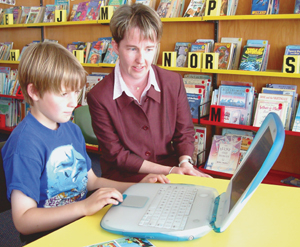![]() THE IMPACT OF NEMP ON TEACHERS’ PROFESSIONAL DEVELOPMENT
THE IMPACT OF NEMP ON TEACHERS’ PROFESSIONAL DEVELOPMENT
![]()
Alison
Gilmore
Each
year NEMP engages approximately 100 teachers for six weeks to
administer NEMP tasks. After one week of training, the teachers,
working in pairs, administer the tasks to Year 4 and Year 8 children
in five different schools. A further 150 teachers are engaged
to mark those assessment tasks requiring professional expertise
and judgement. They work in teams to clarify marking criteria
and assess children’s work that has been recorded on video
and/or paper. This study focuses on the extent to which these
activities enhanced teachers’ professional development. |
Participants
were 272 teachers who had been engaged as administrators or markers between
1995 and 1997. Data were collected through a series of questionnaires,
weekly diaries and case study interviews.
| •
Administering and marking NEMP tasks provided teachers with very powerful
learning experiences about assessment, children’s patterns of
learning, and their own teaching. • Teachers found the experiences very rewarding—probably the best professional development of their careers. • Teachers particularly enjoyed and learned from the close one-to-one interactions with children and the opportunities for interacting and sharing ideas with colleagues. |
•
Teachers gained many new ideas about teaching and assessment to use
in their own classrooms. • Teachers felt more confident and informed about assessment, questioning techniques and instructions, and marking criteria, and gained a greater appreciation of the importance of establishing rapport with children. • Teachers felt a revived motivation for teaching and exploring new ways to assess their students. |
||||||
These teachers’ descriptions of their experiences were typical: |
|||||||
|
I did not view it as direct professional development but rather indirectly
as a valuable experience in which I was exposed to different teachers
and their views, methods, etc. I came away thinking that I was a reasonably
open-minded, objectively oriented, child-minded teacher, who was reasonably
up with the play—not the bottom of the heap or top of the scale,
but O.K. (I was wondering, you see!) Also, that there were many aspects
I could improve or be aware of and that I’d like some input
into my school’s assessment processes. |
|
||||||
| [I have] greater confidence in talking about ‘assessment’, having had this experience. | |||||||
![]()
| NEMP is a very positive learning experience for teachers, contributing in significant ways to their professional development, notably opportunities for them to interact, discuss and share ideas with colleagues, to work with children, and to discuss children’s work. The NEMP experience also has enormous potential value to the learning of students because it facilitates teachers’ confidence and knowledge about assessment generally and NEMP tasks specifically, a situation that enables teachers to better understand the learning needs of their students and to design appropriate learning programmes. |  |